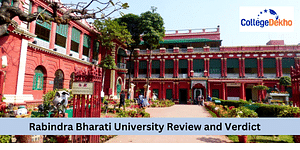MA Sanskrit
MA Sanskrit Course Overview
MA Sanskrit is a two-year postgraduate Sanskrit degree programme. Candidates will learn how to interpret and analyse a variety of Sanskrit texts and literature in this course. The MA Sanskrit course is designed to prepare teachers and scholars in Sanskrit language and literary studies who are skilled in both traditional and modern research methods. The MA Sanskrit syllabus includes topics such as Vedic Literature, Darana, Vykaraa, Shitya, Elective Courses, Ancient Indian Sciences, and Modern Sanskrit Literature.
Most prestigious universities hold entrance exams for MA Sanskrit admission, and candidates are selected based on their performance. Applicants must have a Bachelor degree with Sanskrit as a major or Honours subject and a minimum of 50% marks to be accepted into the MA Sanskrit course. MA Sanskrit course fees can range between INR 10K and 1.70 LPA.
Following completion of the course, candidates may pursue MA Sanskrit jobs such as School Teachers, Language Tutors, Translators, Content Writers, Customer Care Specialist, Interpreter, Sanskrit Professor, Researcher, and others. The average starting MA in Sanskrit salary ranges from INR 3.5 - 9 LPA. Furthermore, MA Sanskrit graduates can further their education. Following getting an MA, they can pursue a PhD in Sanskrit.
Table of Contents
- MA Sanskrit Course Overview
- MA Sanskrit Latest Updates
- MA Sanskrit Course Highlights
- Why Choose a MA Sanskrit Degree?
- What is the Difference Between MA Sanskrit and MA Hindi?
- MA Sanskrit Eligibility Criteria
- MA Sanskrit Entrance Exams
- MA Sanskrit Admission Process in India
- Direct MA Sanskrit Admission Process Without Entrance Exam
- MA Sanskrit Fees in India
- MA Sanskrit Syllabus/Subjects
- Top MA Sanskrit Colleges Offering Direct Admission in India
- Top MA Sanskrit Colleges in India
- Career Options After MA Sanskrit
- Courses After MA Sanskrit Degree
MA Sanskrit Latest Updates
The latest updates about MA Sanskrit admission is listed below:
| Name of Entrance Exam | Date of Entrance Exam |
|---|---|
| Dev Sanskriti Vishwavidyalaya Entrance exam | Application Process (On-going) Exam Date: To be notified |
| CUET PG | Exam Date: March 11 to 28, 2024 |
| Andhra University Common Entrance Test | Andhra University |
MA Sanskrit Course Highlights
The following are some of the major highlights of the MA Sanskrit course admission:
| Course Name | MA Sanskrit |
|---|---|
| Full-Form | Master of Arts in Sanskrit |
| Course Level | Postgraduate |
| Duration of the course | 2 years |
| Eligibility | Bachelor degree with Sanskrit as a major or Honours subject with minimum 50% marks |
| Admission Process |
|
| Job Profile | Primary and Secondary School Teachers, Language Tutors, Translators, Content Writers, Sanskrit Teacher, Online Transcript, Lecturer, Official Language Officer, Sanskrit Typist, etc. |
| Top Employment Areas | Colleges and universities, private organisations, temples, private academic institutions, translation service providers, tourism sector, print media organisations, TV channels, etc. |
| Average Starting Salary | INR 3.5 - 9 LPA |
Why Choose a MA Sanskrit Degree?
MA Sanskrit can help you understand the concept of many words in Indian and foreign languages. This course also helps you understand ancient Sanskrit texts, shlokas, and other Sanskrit words in their true context, with nothing lost in translation. Following the completion of MA Sanskrit, candidates will be able to read and understand the original text with ease. The MA Sanskrit course serves as a foundation for further studies as well as opportunities for advanced academic exploration and research through PhD courses. MA Sanskrit course has a particular emphasis on jobs. Students can choose from a variety of career paths in both the public and private sectors after completing this course.
Postgraduates in MA Sanskrit may find employment as a home tutor, official language officer, lecturer, online transcript provider, Sanskrit teacher, or typist. Nowadays, the salary range for an MA Sanskrit in India is INR 3.5 - 9 L annually.
What is the Difference Between MA Sanskrit and MA Hindi?
The two postgraduate language courses, MA Sanskrit and MA Hindi, have slightly different course descriptions. The following table compares the two courses.
| Parameters | MA Sanskrit | MA Hindi |
|---|---|---|
| Qualification | Postgraduate | Postgraduate |
| Duration | 2 years | 2 years |
| Examination Type | Semester | Semester |
| Eligibility | Bachelor degree with Sanskrit as a major or Honours subject with minimum 50% marks | Bachelor degree with Hindi as a major or honours subject with minimum 50% marks |
| Admission Process | Merit- based, Entrance exam based | Merit- based, Entrance exam based |
| Colleges | Chinmaya Vishwa Vidyapeeth (CVV), Ernakulam, Kerala, Delhi University, Amity University, etc. | Savitribai Phule Pune University, Shreemathi Nathibai Damodar Thackersey Women’s University, etc. |
| Average Starting Salary | INR 3.5 - 9 LPA | INR 2 - 4 LPA |
| Job Roles | School Teachers, Language Instructor, Translators, Content Creator, Literary Critic, etc. | Hindi Teachers, Translators, Content Creator, Editors etc. |
MA Sanskrit Eligibility Criteria
Applicants must fulfil certain criteria so as to be accepted in MA in Sanskrit course. The eligibility criteria for admission in the MA in Sanskrit course are as follows:
- Candidates must have a bachelor's degree in arts from a reputable university.
- Must have scored at least 50% in the Bachelor's degree examination.
- Students interested in the Sanskrit language and interested in preserving and spreading the language are eligible for admission.
- Applicants must have studied Sanskrit as a major subject in their undergraduate programme.
- For the course, students should have good speaking, reading, and writing skills.
MA Sanskrit Skills Required
The skill set required for pursuing MA Sanskrit is as follows:
- Creative Thinking
- Effective Communication
- Writing skills
- Proficiency in more than one language
MA Sanskrit Entrance Exams
The educational institutions which hold entrance exams for admission to the MA Sanskrit, are included in the following table:
| Name of the Entrance Exam | Name of the Institution |
|---|---|
CUET
|
|
| Dev Sanskriti Vishwavidyalaya Entrance exam | Dev Sanskriti Vishwavidyalaya |
| Andhra University Common Entrance Test | Andhra University |
MA Sanskrit Admission Process in India
MA Sanskrit admission procedures in India may differ slightly from other courses because these courses require a unique set of skills and knowledge. Most colleges still use an entrance exam to select students for admission, which is followed by an interview and/or group discussion. The following are the admissions procedures for MA Sanskrit programmes in India.
- Entrance-Based MA Sanskrit Admissions
- Merit-Based MA Sanskrit Admissions
Though the MA Sanskrit admission process varies by college, the following are the general steps to admission:
Step 1: Submit your online MA Sanskrit application.
Step 2: Pay the registration fee and any additional fees that may be charged if admission is granted based on merit. Candidates for MA Sanskrit entrance-based admissions must take and pass an exam.
Step 3: Candidates who have been shortlisted will be invited to the next stages of the selection process, which may include personal interviews, group discussions, or counselling.
Step 4: Once all of the preceding steps have been completed, candidates must submit all required documents and fees in order to be admitted to the MA Sanskrit programme.
Direct MA Sanskrit Admission Process Without Entrance Exam
MA Sanskrit admissions are typically determined by merit at most colleges and universities. Candidates will be accepted to the MA Sanskrit programme based on their performance in a written 10+2 exam, a series of in-person interviews, and/or a relevant qualifying exam. Mainly, candidates are shortlisted in such cases based on their academic record as well as their performance in a previous relevant exam.
MA Sanskrit Fees in India
MA Sanskrit course fees can range between INR 10K and 1.70 LPA. Course fees may vary depending on the MA Sanskrit colleges. Considering its facilities and infrastructure, a government-based institute will have fees less than a private institute.
The MA Sanskrit annual fees charged by the respective educational institution are as follows:
| Name of the Institute | Annual Fees |
|---|---|
| Dev Sanskriti Vishwavidyalaya | 46K |
| S.N.D.T. Women’s University | 15K |
| Chinmaya Vishwa Vidyapeeth (CVV), Ernakulam, Kerala | 1.13L |
| Amity University | 21K |
| National Sanskrit University, Tirupati | 10K |
| Tripura University | 10K |
| Pondicherry University | 15.4K |
| University Of Kalyani | 10 K |
| Punjabi University | 18K |
| University Of Madras | 12K |
| Andhra University | 1.70L |
MA Sanskrit Syllabus/Subjects
The MA Sanskrit syllabus has been divided down into four semesters. The table below summarises the MA Sanskrit course semester by semester:
| Semester 1 | Semester 2 |
|---|---|
| Vedic Literature | Vedic Literature – II |
| Dar?ana - I | Dar?ana - II |
| Vy?kara?a - I | Vy?kara?a - II |
| S?hitya - I | S?hitya - II |
| Elective Course -1 | Elective Course -2 |
| Ancient Indian Sciences | Buddhist Sanskrit Literature |
| Modern Sanskrit Literature | Ancient Education Tradition |
| P?li Language - I | P?li Language - II |
| Pr?k?t Language - I | Pr?k?t Language - II |
| Inscriptions and Manuscriptology | N??ya??stra and Musicology |
| Semester 3 | Semester 4 |
|---|---|
| Vy?kara?a Dar?ana and Nirukta | V?kyapad?ya |
| Dar?ana specific core I – Yoga and Advaita Ved?nta I | Dar?ana specific core I – Yoga and Advaita Ved?nta II |
| Dar?ana specific core II – Ny?ya Dar?ana I | Dar?ana specific core II – – Navyany?ya and Buddhist Ny?ya |
| Dar?ana specific Elective - 1 | Dar?ana specific Elective - 1 |
| Ved?nta Traditions | Bauddha Dar?ana |
| Upani?ads | Jain Dar?ana |
| Kashmir ?aivism | Western Philosophy |
| Bhagavadg?t? - I | Bhagavadg?t? - II |
| Vy?kara?a specific core I – Ti?anta Prakriy? | Vy?kara?a specific core I – Ti?anta Prakriy? II |
| Vy?kara?a specific core II – Taddhita and K?danta Prakara?a | Vy?kara?a specific core II – ?a?li?gi Prakara?a |
| Vy?kara?a specific Elective - I | Vy?kara?a specific Elective - I |
| Paribh??endu-?ekhara | Sandhi and Str?pratyaya |
| Paramalaghu-mañj??? | Vaiy?kara?a-bh??a?a-s?ra |
| Vy?kara?a-Mah?bh??ya | Vy?kara?a-Mah?bh??ya II |
| Pr?k?ta Vy?kara?a | Pr?k?ta Vy?kara?a II |
| Linguistics | - |
| Workshop – Research Methodology and tools useful for research | Dissertation |
Top MA Sanskrit Colleges Offering Direct Admission in India
The top MA Sanskrit Colleges Offering Direct Admission in India are as follows:
- Amity University
- University Of Kalyani
- Punjabi University
- University Of Madras
Top MA Sanskrit Colleges in India
The following are some of the top colleges in India for pursuing MA Sanskrit degree:
| Name of the Institute | Annual Fees |
|---|---|
| Dev Sanskriti Vishwavidyalaya | 46K |
| S.N.D.T. Women’s University | 15K |
| Chinmaya Vishwa Vidyapeeth (CVV), Ernakulam, Kerala | 1.13L |
| Amity University | 21K |
| National Sanskrit University, Tirupati | 10K |
| Tripura University | 10K |
| Pondicherry University | 15.4K |
| University Of Kalyani | 10 K |
| Punjabi University | 18K |
| University Of Madras | 12K |
| Andhra University | 1.70L |
Career Options After MA Sanskrit
Following their completion of the MA Sanskrit programme, students can find work in both public and private sector organisations for advanced research and exploration.
Graduates with an MA in Sanskrit can find employment in a variety of fields, such as print media companies, TV channels, private companies, temples, private schools, and the tourism industry. Postgraduates in MA Sanskrit can find excellent employment opportunities as Sanskrit teachers, online transcript providers, official language officers, home tutors, and more.
The table below lists some of the most popular jobs available to MA Sanskrit graduates, along with their expected salaries:
| Job Profile | Job Description | Average Salary |
|---|---|---|
| Sanskrit Typist | A Sanskrit Typist's responsibilities include transferring data from paper formats into digital files or database systems, transcribing documents from audio tapes, gathering and organising typing material, creating spreadsheets and presentations, editing completed work for grammar, and so on. | INR 3,20,000 |
| Content Developer | A Content Developer's duties and responsibilities include creating content, managing content distribution, and so on. A Content Developer works with other departments to create content, and they are rarely lone wolves. They also examine key performance indicators to determine the effectiveness of content, among other things. | INR 3,80,000 |
| Online Transcript | Transcribers write up audio or video recordings, meetings, and conversations. Listening to audio and translating it into long-form text, reviewing drafts of written transcriptions, and liaising with clients to ensure they are satisfied with the final documents are all part of the job. | INR 4,16,000 |
| Training Officer Hindi | A training officer's responsibilities include providing high-quality professional training courses and materials, as well as providing advice as needed to ensure that all members of staff, new and old, within and outside the department, are properly trained. | INR 4,28,000 |
| Lecturer | A Lecturer's responsibilities include obtaining access to the most recent version of the department's exam policy, providing instructions to students, and ensuring that exams are conducted in a safe environment. They essentially teach students the fundamental concept of a particular subject. | INR 6,80,000 |
Salary Offered After MA Sanskrit
The following table lists some of the most common job profiles for candidates with a MA in Sanskrit, along with an estimated salary:
| Job Profile | Average Salary |
|---|---|
| Sanskrit Typist | INR 3,20,000 |
| Content Developer | INR 3,80,000 |
| Online Transcript | INR 4,16,000 |
| Training Officer Hindi | INR 4,28,000 |
| Lecturer | INR 6,80,000 |
MA Sanskrit Top Recruiters
The following is a list of the top recruiters that hire candidates with MA Sanskrit:
- Naropa University
- Maharishi University of Management
- Historical Societies
- NCERT
- Kendriya Vidyalaya
- SKM Yoga
- AstroVed
- Sage Publications
MA Sanskrit Employment Area
After MA Sanskrit, the candidates have the option of working in following employment areas:
- Colleges and Universities
- private Organisations
- Temples
- Private Academic Institutions
- Translation Service Providers
- Tourism Sector
- Print Media Organisations
- TV Channels
- Sanskrit Research Areas
- Fields of Publication
- Engagements in Consulting
- Cultural Institutions
Courses After MA Sanskrit Degree
Students who have completed their post-graduate studies in Sanskrit have a wide range of career options. The following are the future prospects for MA Sanskrit students. After completing their MA Sanskrit course, students can pursue higher education and research opportunities.
Candidates with a MA in Sanskrit are eligible to enrol in following courses:
- B.Ed. : Students who want to work as a teacher in either public or private schools should consider enrolling in a B.Ed degree programme. This course will provide them with the knowledge and skills needed to teach at various school levels.
- PhD: Students can also enrol in PhD programmes in the discipline of their choice. Along with extensive research and studies on the subject, this opens up a plethora of opportunities for higher-paying jobs.
Also,
- Competitive Exams: After completing their post-graduate studies in Sanskrit, students can take various competitive examinations for government jobs.
- Junior Research Fellowship: Students can also apply for the NTA-UGC NET-JRF, which will grant them eligibility for employment as Assistant Professors in Indian colleges and universities as well as research opportunities at top universities.
- Courses
- MA Sanskrit


















